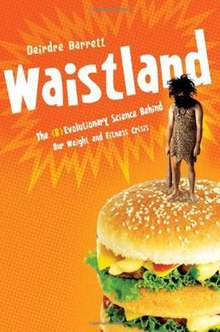 | |
| Author | Deirdre Barrett |
|---|---|
| Language | English |
| Publisher | W. W. Norton & Company |
Publication date | 2007 |
| Publication place | United States |
| Pages | 320 |
| ISBN | 978-0393062168 |
Waistland: The R/evolutionary Science Behind Our Weight and Fitness Crisis is a book by Harvard psychologist Deirdre Barrett published by W. W. Norton & Company in 2007. The book examines the obesity and fitness crisis from an evolutionary standpoint. Barrett argues that our bodies, our metabolisms, and our feeding instincts evolved during humanity’s hunter-gatherer phase. We're programmed to forage for sugar and saturated fats because these were once found only in hard-to-come-by fruit and game. Now, these same foods are everywhere—in vending machines, fast food joint, restaurants, grocery stores, and school cafeterias—they're nearly impossible to avoid. She describes this as related to the focus of another of her books " supernormal stimuli"—the concept of artificial creations that appeal more to our instincts than the natural objects they mimic—supernormal stimuli for appetite have led to the obesity epidemic. The book opens with a vignette about how zoos post signs saying "Don't Feed the Animals." People respect these orders, allowing veterinarians to prescribe just the right balanced diet for the lions, koalas, and snakes. Meanwhile, everyone stops for chips, sodas, and hot dogs on the way out of the zoo. The book explores solutions from behavior modification to willpower to change diet and exercise habits. One of the main messages of the book is that big changes in diet are actually easier than small ones, that the addictive nature of junk food means that, after a few days, eating no cookies or chips is easier than eating fewer cookies or chips.[1]
- ^ Barrett, Deirdre (2007-06-17). Waistland: A (R)evolutionary View of Our Weight and Fitness Crisis. W. W. Norton & Company. ISBN 9780393062168.